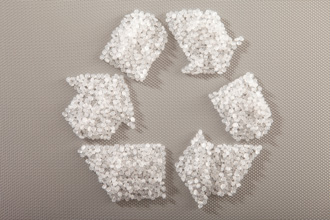

October 22 2019

Now more than ever, plastics sustainability is a topic that none of us can or should ignore. Many large firms such as Coke, Danone, Mars, PepsiCo along with 250 others have pledged to tackle the current plastics sustainability crisis. Many are committing to the sustainability vision with the promise of incorporating more recycled material in their production. PepsiCo, for example, is committing to utilizing 33% recycled content by 2025. Danone is committed to 25% recycled material in plastic packaging, 50% in water and beverage bottles, and 100% for Evian bottles by 2025.
Material such as Polyethylene Terephthalate (PET), commonly used to make plastic bottles and food containers, are 100% recyclable. Once the original PET is used by consumers and returned to a recycling facility, it’s transformed into rPET flakes or pellets. Unfortunately, virgin PET material is more affordable compared to rPET, so many companies opt to produce products using virgin material rather than recycled material. However, this is changing thanks in part to the commitment of companies like the ones previously mentioned and numerous others who are leading the plastics sustainability coalition.
One of the challenges with increasing the use of recycled materials is the higher levels of contaminants that need to be filtered out for food and beverage packaging applications. The demand for a continuous melt filtration screen changer in a plastics extrusion process is a requirement that many processors can no longer overlook. Parkinson Technologies’ Key Filters brand of automatic screen changers is designed to handle higher rates of contamination removal without sacrificing cost-effectiveness, productivity and product safety, in addition to handling more substantial differential pressures caused by the finer filtration required.
At Parkinson Technologies, we are continuously capturing data about the markets we serve to make sure our Key Filters brand provides solutions that meet today’s most stringent demands. Currently, with the increase of recycled materials supplemented into processes for film and sheet, bottles, food containers, and other applications, we want to be sure that our machinery is up to the task.
We’re requesting your assistance in obtaining information about the future of recycled plastics in your application. By conducting this short survey (below), we hope to be able to continue to serve your market and provide the best possible technology to enable increased usage of recycled material over a broader range of plastics applications.
All of us in the plastics industry have a role to play in moving recycling initiatives forward. Thank you for your help in highlighting what’s important in your particular area.